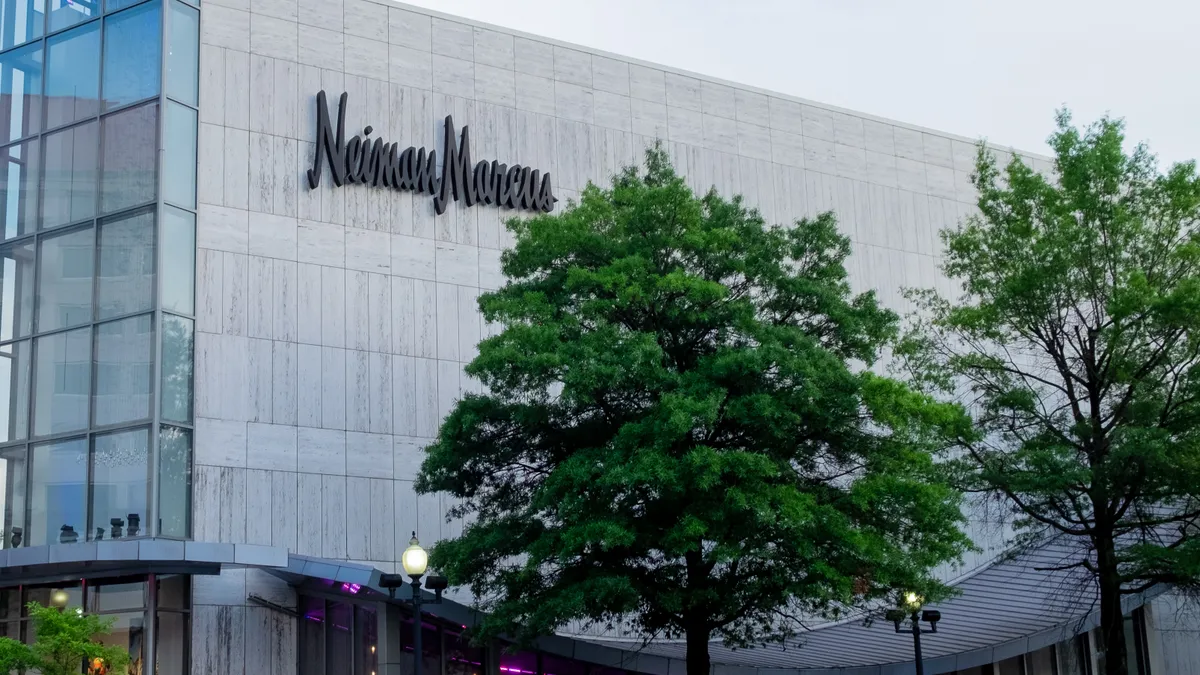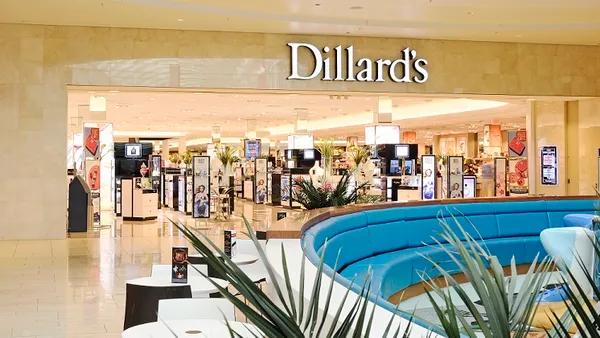Dive Brief:
- A creditor group is taking aim at a key provision in Neiman Marcus' bankruptcy plan. Unsecured creditors described stock in the MyTheresa e-commerce unit, which they would receive as part of a settlement, as having "illusory" value.
- Without more protections on the stock, the distribution is a "farce," the committee of unsecured creditors said in court papers. They are pushing for mediation ahead of the confirmation hearing as part of an effort to avoid a "very unproductive, protracted Confirmation Hearing."
- In another twist in the case, Marble Ridge Capital, Neiman's largest unsecured creditor and a legal antagonist of the retailer and its private equity owners over the past two years, is winding down after the U.S. trustee overseeing Neiman's Chapter 11 found it breached its fiduciary duty as a former member of the unsecured committee to Neiman.
Dive Insight:
MyTheresa was one of the bright points of Neiman Marcus' business during years of financial distress and declining sales. Since the retailer acquired it in 2014, the e-commerce darling has doubled its revenue and value. It has also haunted Neiman's bankruptcy case and multiple efforts to restructure its debt.
At issue is MyTheresa's place in Neiman's corporate flowchart. Prior to 2018, it rested under the retailer's control. But, through some complicated paper shuffling, the unit moved under an entity directly controlled by Neiman's owners, and out of the reach of creditors.
Marble Ridge waged a legal and rhetorical war over the move. After one case was dismissed, UMB, a trustee for a group of Neiman bonds, filed suit against Neiman and, later, against private equity owner Ares Management. MyTheresa has also been the subject of investigation within Neiman's bankruptcy case — a key point of negotiations, driven largely by Marble Ridge and its leader, Dan Kamensky.
Kamensky has not been shy about driving the fight into public. He and his hedge fund have alleged since 2018 that Neiman was insolvent at the time of the MyTheresa transfer, which would mean the corporate structure change amounted to default and potentially a fraudulent transfer. Neiman throughout has said that it did not break any of its debt obligations or engage in wrongdoing.
An independent consultant later found that the company had overestimated the value of Neiman and underestimated the value of MyTheresa, making Neiman insolvent at the time it transferred MyTheresa. More, an independent board director of Neiman found that creditors had a plausible claim against the retailer and its owners. That led to a settlement where creditors would receive MyTheresa stock and hopes of a quiet end to the fight and a smooth exit from bankruptcy.
Ironically, Kamensky is under fire now after having won concessions from Neiman for the unsecured creditors.
Kamensky had offered to buy other creditors MyTheresa stock to give those that wanted it a cash-out option under the bankruptcy plan. According to communication unearthed by the U.S. bankruptcy trustee, Kamensky engaged in a "frenzy of activity" once he learned of a potential rival bid from the investment bank Jefferies, including texts to employees of Jefferies telling them to "stand down" and not bid on the MyTheresa stock.
Being a member of the unsecured creditors committee, which in bankruptcies is tasked with pushing for the best interests of all unsecured creditors, Kamensky violated his fiduciary duty, in the trustee's opinion. If the court agrees, it could threaten Kamensy's share of the creditor payouts and potentially cause other legal problems for him. (Kamensky and Marble Ridge earlier stepped down from the committee, after his efforts to block Jefferies from making a cash bid for MyTheresa stock was initially brought to light.) Now, Kamensky's firm is shutting down entirely, a spokesperson confirmed for Retail Dive after news reports broke of its wind down.
After talk of a deal, those MyTheresa shares are being attacked by the unsecured committee, which is pushing to endow the stock that would go to unsecured creditors with the same protections that Ares and other current owners enjoy. Ares for its part said in court papers that "alterations to the Series B Shares [i.e., that unsecured creditors would receive] were never part of the settlement negotiations — because they are not part of the currency the Sponsors hold." A status conference is set for Monday afternoon on the matter.
The fight could make for a messier end to Neiman's bankruptcy case than it had hoped for. Fortunately for the retailer, the fight hasn't been over the prospect of reorganization itself. Creditors see value in a restructured Neiman's. Bankruptcy gives the company an opportunity to lighten its debt load and trim its footprint. To that end, the retailer moved to close four of its mainline stores in July, and recently added a fifth store, in Washington, D.C., to its planned closures.














